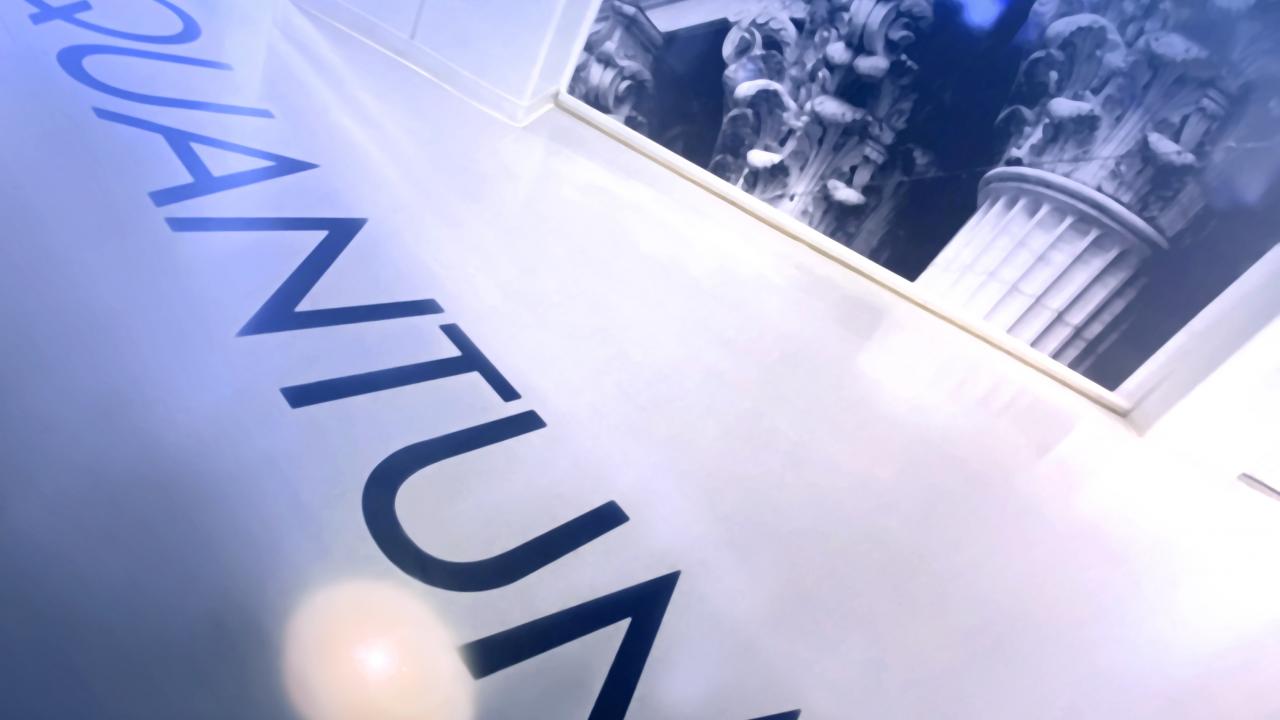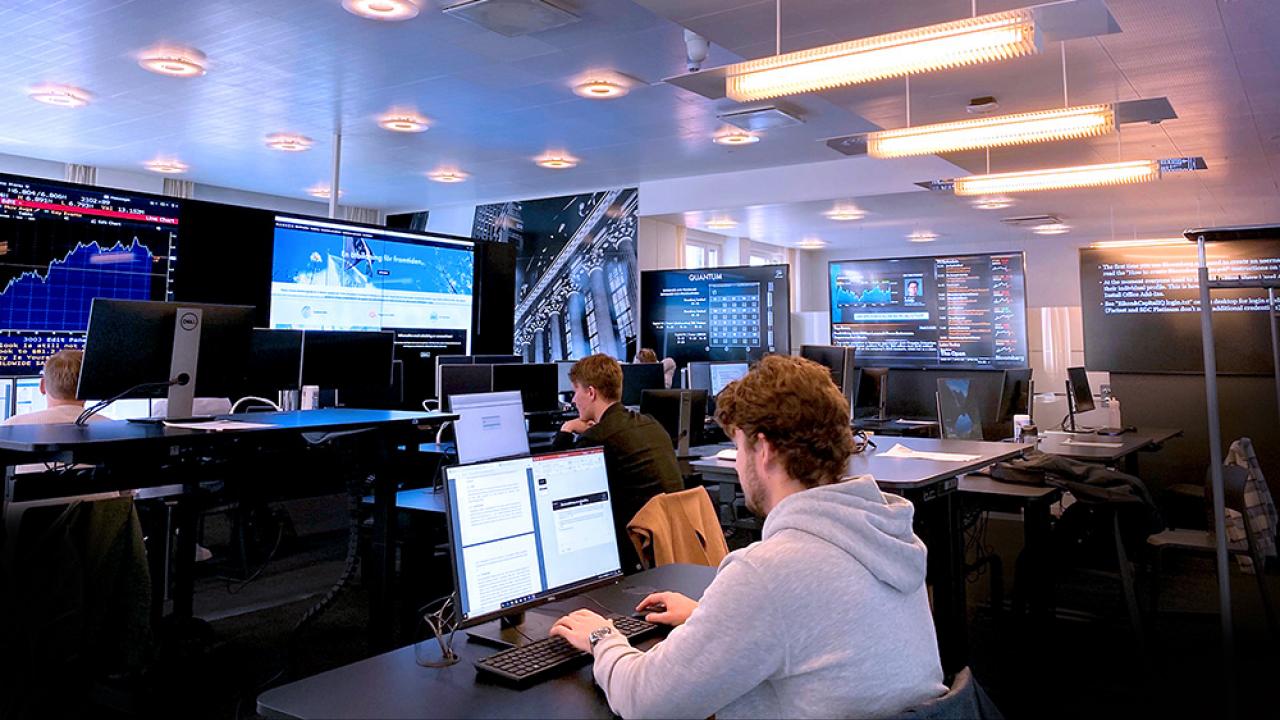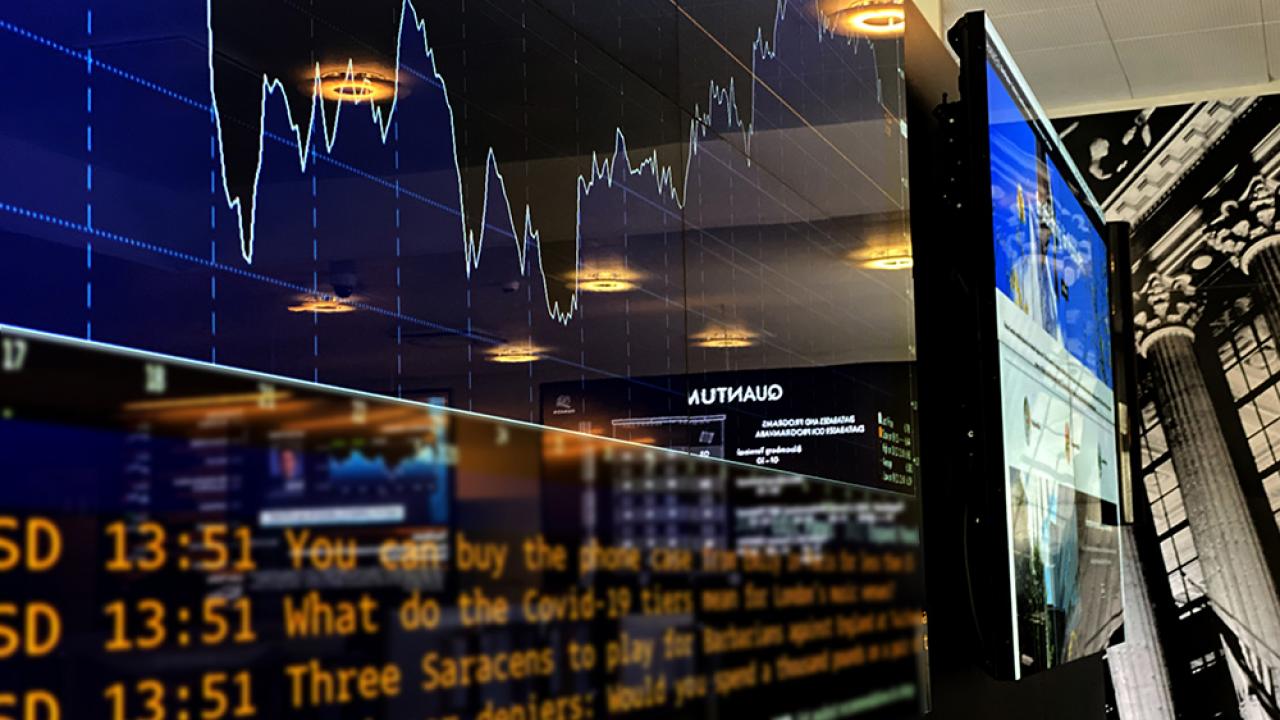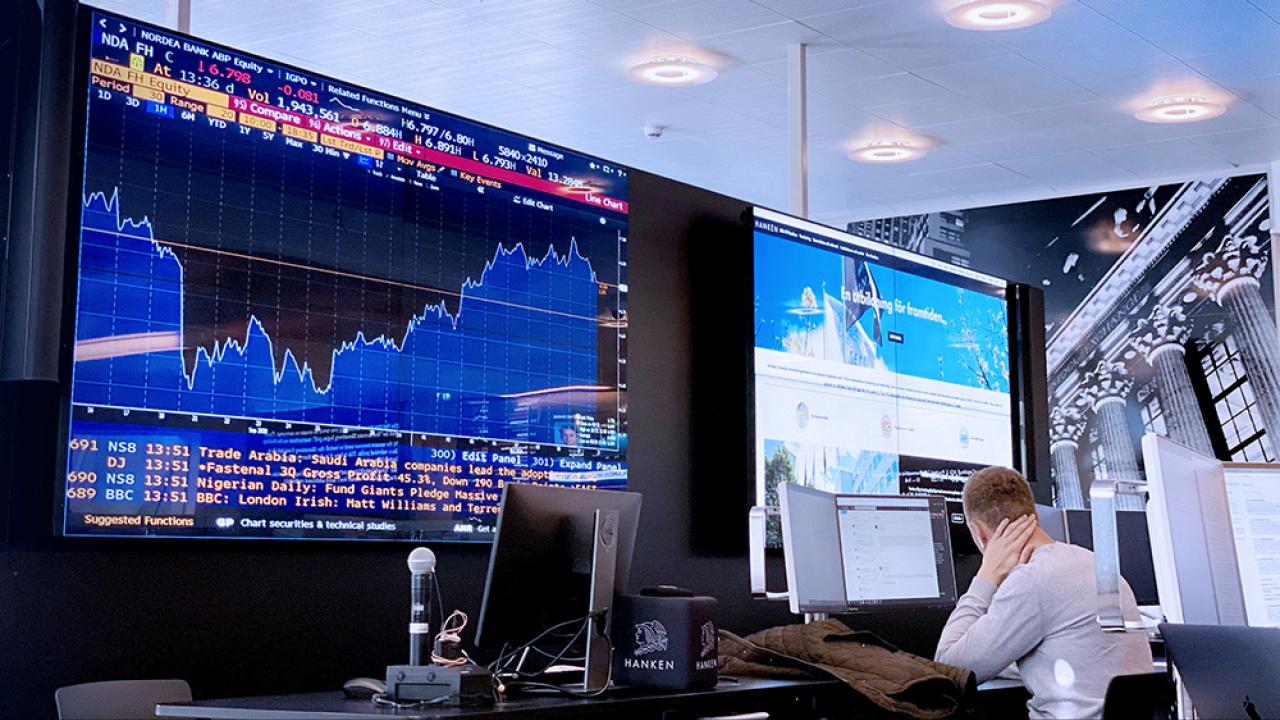Quantum – a Gateway to Global Big Data

Quantum's director Othmar Lehner, let’s start with the obvious question “Why Quantum?”
Quantum was necessary. There were always good databases and computer rooms at Hanken, but we felt that wasn’t enough. We wanted to offer our students and graduates the very latest in data science and data bases concentrated in one integrated, beautifully designed stock market-like physical space. At the same time our aim was to create a globally visible symbol, signifying the commitment of Hanken to embrace the latest technology in its educational aim to build a “digital fluency” for its graduates.
Interesting, what is digital fluency all about?
Well, digital fluency is like a language that you have to learn to interact with the right tools at the right time. As a business school our students should be able to make use of the latest technology in a way that makes sense; we don’t educate programmers but managers who have to understand different tools and programs that they use for specific tasks. They have to be able to critically analyze data and crosscheck feasible outcomes. Sometimes the tools themselves can come to their own conclusions that are based on data, but perhaps already the one feeding the data made a mistake.
Whose idea was Quantum?
The whole board was behind the idea and the project was part of Hanken’s 110 years celebration and the fundraising campaign HANKEN 110. Everyone agreed that this is something that Hanken will need to be competitive in the future. The campaign focused on creativity and Quantum represents creativity and creative thinking in many ways. Creativity also played an important role when planning the physical space. We asked for input from all concerned during the planning and design process, student representatives also had their important say.
Spaces like these are trending among universities but ours is one of a kind – I have rarely seen the kind of beauty we have here. We sometimes call it an oasis because it combines the beauty of technology with a green, relaxing interior with trees, tables and cushioned chairs only a few steps away. We have taken into account the well-being of students. They spend so much time in front of the computers that they need a bit of greenery and relaxation, too.
I have to ask, what does Quantum stand for?
There is no official definition of what Quantum is. We intentionally keep it abstract and personal. For me, Quantum stands for a quantum leap, which is this sort of jump into the future, into artificial intelligence and data-driven management decisions. The fact that our business school along with every modern university has to dedicate itself to individualized, centralized services and learning opportunities is quite a leap as well, don’t you think?
What is actually available here?
Our value-promise is that any database that is widely used in a specific field for research is most likely available here.
For example, we have access to 10 official Bloomberg terminals with the Bloomberg TV channel. The terminals are fitted with Bloomberg’s own screens and keyboards. Bloomberg is one of the most famous data bases with a subscription service that is very important for the business world and skills in querying this database are highly sought after.
We have 20 super-fast Dell computers with Intel i7 processors, 32GB memory and 1TB SSD hard disks.
In addition, we have two large matrix screens – 4 x 55-inch panels each – and three 86-inch display screens around the whole area that allow us to present different things on different screens simultaneously. We have, for example, connected these screens to Bloomberg TV. This means our students get up-to-date news on the whole corporate world.
And while our students certainly don’t have to make these multi-million decisions right now, they will be used to using these screens and information broadcasts when they are working in companies. They will immediately be able to use them and know how it all works.
Which terminal is the most popular?
All of them have their merits and different uses. But we see that most students access Capital-IQ, Eikon and of course Bloomberg databases.
But we are very flexible and have a good review system in place that allows adapting quickly to different data base needs and changes in the research landscape.
Even during the Corona crisis we tried and try to keep Quantum open and running as much as possible, so most students doing research for their master’s or doctoral theses are able to use the Quantum and the databases throughout these difficult times.
Who are the facilities primarily for?
It is important to note that Quantum is for all students, researchers and graduates of Hanken, no matter which major they specialize or do research in. We will have distinct QC-courses where students from all departments get insights into databases and can identify the courses by the newly established code (QC). Our board has representatives from every department to safeguard their interests.
A second important thing to note is that Quantum as a space is also open for traditional courses and we invite the professors from all departments that teach courses to use the available technology in their own curriculum. We hope to identify key members in every department who can then transfer the knowledge from the Quantum to the specific domain in their department. Quantum can be different things for different people. It’s a post-modern world thing to leave open to the student or graduate what to make out of Quantum. For us, it’s a physical space that combines and shows the focus on data and data-science and even artificial intelligence for our students and our research, which is very important to us.
Quantum should also be understood as a vision of Hanken; we see ourselves educating future leaders who have a solid understanding of how data-driven insights can help them make better business decisions. And these business decisions are not just for making more profit, they are also for being more sustainable. And that is a very important goal for me, but also especially for Hanken.
How could a student use Quantum?
One example would be that you can now download data from around the globe in very large quantities, what we call Big Data. Through the software that we have installed here at Quantum, you can immediately process the data, analyse it, come to conclusions and graphically present these conclusions even on the web. The workflow, from accessing data to the presenting of the data in a meaningful way for the decision-makers, for the CEO of a company, for example, is something that we teach our students, our graduates and, in the future, our industry partners.
What about alumni use?
Alumni have been very involved in the whole process. We have had lots of advisory meetings and inclusive talks.
I mention the graduates, our alumni, again and again, because I think the future is all about life-long learning that will allow graduates to come back to us for Quantum seminars or courses to get updates on the latest technology and the latest ideas. We will combine small courses or seminars with evening get-togethers for alumni, current students, professors and partner companies
And what might a course look like?
For example, I’m creating a course at the moment that uses big data to assure sustainability reporting. For the first time it’s not about a company telling you what wonderful green things they do. Instead, we can use actual data to determine whether they actually do what they say - and who does it best. Investors will in this way be provided with a guide about what to consider. Would we want to invest in a company that basically abuses the planet? Or would we want to invest in someone who comes up with technology that might save the planet?
The general public, customers and employees might also use this sustainability data to determine what is acceptable to them?
Yes, completely! As somebody coming from the accounting department, I am used to checking for these reports. But now also people coming from, let’s say, human relations or marketing, can critically check feasible sustainable outcomes. To use the data is important not just for accounting and finance, but should run throughout the DNA of all departments.
I think we need to create a strong signal to the Hanken students, to our prospective students in the future, and to our graduates, that we will be one of the most innovative universities in the Nordic countries, and that data science and quantitative matters are not just side effects, but will be the whole DNA of our study programs complementing the strong focus on sustainability. And that, in typical Hanken fashion, happens in good and close relationship with our industry partners. With those who basically employ our graduates. We educate our students to cope with what is needed on the market.
Associate Professor Othmar Lehner is the Director of the Hanken Centre for Accounting, Finance and Governance. He was appointed Director of Quantum in February 2020 when it opened in the presence of the donors from industry and corporations that made it happen. He is also Associate Professor in Accounting at Hanken, Vice Dean for the QTEM Programme and Editor-in-Chief for the Emerald Journal of Applied Accounting Research.
Text: NINA WINQUIST
Photo: PIA PETTERSON





